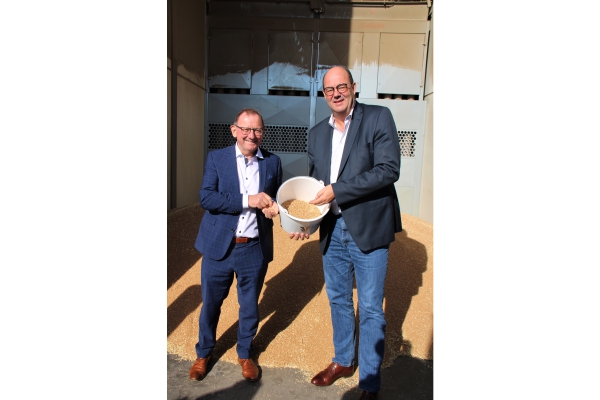 (L-R) Fernand Etgen, President, Chamber of Deputies; Claude Haagen, Minister for Agriculture, Viticulture and Rural Development;
(L-R) Fernand Etgen, President, Chamber of Deputies; Claude Haagen, Minister for Agriculture, Viticulture and Rural Development;
On Wednesday 21 September 2022, Luxembourg's Minister for Agriculture, Viticulture and Rural Development, Claude Haagen, met the representatives of the cereals sector (De Verband Group, Lëtzebuerger Saatbaugenossenschaft - LSG, Bauerekoperativ - BAKO SC and Moulins de Kleinbettingen) in the premises of De Verband in Colmar-Berg to take stock of the harvest and yields.
Good, historically early grain harvest, but strong regional fluctuations
Cereal crops performed quite well in spring 2021, only late-sown winter wheat and spring cereals were a concern given the lack of rain. The regionally different rain distribution in spring and the hot days in May and June were the cause of different yields in the harvest. Above all, in the south of the country and along the Moselle, as well as on light sites, the drought led to below-average yields. Nevertheless, the grain harvest achieved a high level nationwide. As far as the historically early point in time of the harvest is concerned, the first winter barley was received at the collection points as early as mid-June. The last grain stocks were already threshed in the Ösling at the beginning of August. The 2022 harvest was dry, with no energy consumption from gas or heating oil.
The quality of the delivered summer grain and rapeseed was good. Due to the drought, the disease burden of the grain was significantly lower than in the previous year, according to Klaus Palzkill (De Verband), Steve Turmes (LSG) and Günther Mertes (BAKO SC).
Oats and spelled were also convincing with excellent qualities, especially in hectolitre weight, and higher intake quantities due to larger cultivation areas. Oats and spelt will again be marketed at very good prices this year, says Günter Mertes (BAKO SC).
The acreage of winter wheat for the local bread grain and flour production for the label "Produit du terroir - Lëtzebuerger Wees, Miel a Brout" declined slightly in 2022. The harvested quantities are at the same level as in previous years, so that the domestic market is supplied. The quality of soft wheat, for the production of bread, and durum wheat, for pasta, is excellent this year, according to Jean Muller (Moulins de Kleinbettingen).
The good yields were only achieved by those farms that managed and fertilised their stocks optimally.
Grain prices and volatile production costs at a high level
After the 2021 harvest, grain prices rose continuously until the end of February. The reasons for this development were markets with scarce supplies, which met with high demand. After the start of the Ukraine war, grain and rapeseed prices literally exploded because of great concerns about sufficient global food supplies. Parallel to the better earnings, the costs for fertiliser and energy rose to a significantly higher extent. The profitability of arable farming this year depends on the timing of fertiliser purchase and the date of grain sale.
Problems with potato and forage crops, poor maize and grassland yields
Minister Haagen is concerned with the yields of maize and grassland. Grassland stopped growing almost nationwide from mid-June due to a lack of precipitation. On the ASTA test plots, the yield losses in the grassland over three cuts are currently around 30%, regionally the yield losses can be even greater. With a bit of luck, a last grassland cut can be brought in in autumn, but the yield remains well below the previous year's values.
In many places, the corn did not survive the drought well and was harvested with significant losses in yield and quality. The maize harvest started very early due to the many hours of sunshine and was largely over by the third week of September.
Poor yields from potatoes are also a cause for concern. The lack of rain in the summer months slowed down the growth of the tubers.
Minister Haagen underlined the importance of domestic grain, plant and feed production, especially in times of crisis when short and reliable supply chains are becoming increasingly important and consumers are interested in products from the region.
Minister Haagen also discussed crop failure insurance supported by the Ministry of Agriculture, Viticulture and Rural Development. The crop failure insurance gives farmers the opportunity to insure their crops against hail, heavy rain, frost and drought, 65% of the contribution is covered by the Ministry.
The harvest talks took place in the buildings of the traditional cooperative company De Verband, an important partner for farmers and marketers in the grain market. Thanks to the optimal infrastructure with numerous acceptance points, drying and cleaning facilities and sufficient storage capacity, it contributes to the smooth running of the grain harvest in Luxembourg.
His Royal Highness the Grand Duke joined in late afternoon to find out about the progress of the harvest talks.
Minister Haagen will soon meet with the representatives of the grain sector as part of the "Kärendësch Exchange".








